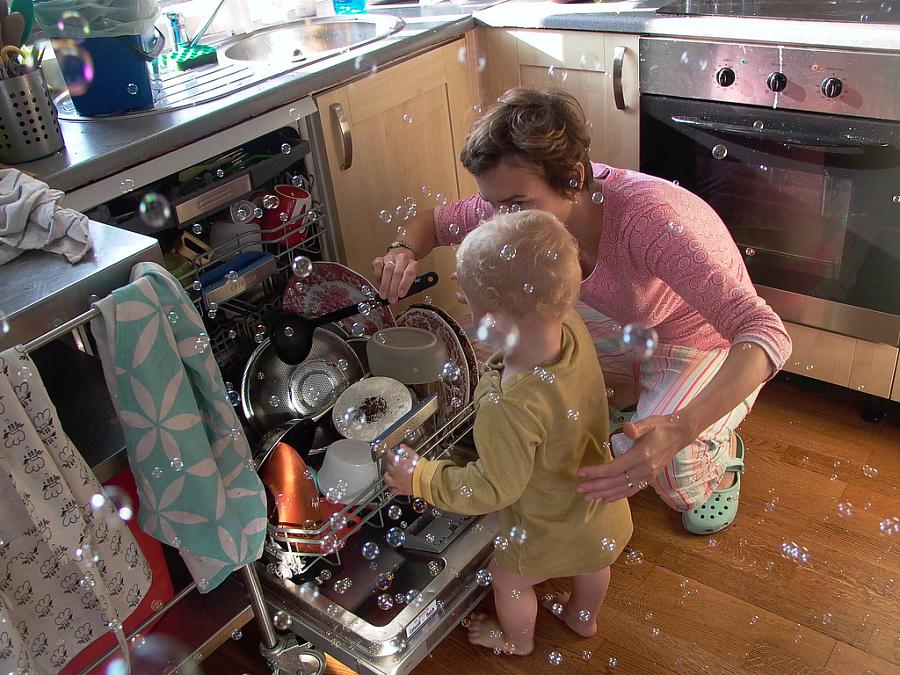It’s been a big week for Bamba and dirty dishes

Does the dishwasher work a little too well?
If you had to slap a label on this week in children’s health news so far, you might call it “Exposure Week.”
Not because Neil Patrick Harris revealed too much to kiddies watching the Oscars, nor because schoolchildren across the Eastern seaboard still have to trudge to school through subzero polar vortices.
Rather, two high-profile studies came out with similar conclusions: Exposing kids to microbes and potential allergens may well lead to fewer allergies and more robust, better adjusted immune systems.
Exhibit A: On Monday, the journal Pediatrics published a study of 1,029 Swedish children, ages 7 to 8. Most of the kids (84 percent) lived in families who used a dishwasher, while the others were from families that hand-washed their dishes.
The kids from dishwasher families were more likely to have allergies, eczema and asthma than those that hand-washed. The study’s conclusion:
In families who use hand dishwashing, allergic diseases in children are less common than in children from families who use machine dishwashing. We speculate that a less-efficient dishwashing method may induce tolerance via increased microbial exposure.
In an interview with NPR, Dr. Todd Mahr, an allergist, praised the study even as he urged caution. “I think it’s very intriguing and lands one more ‘x’ on the column for the hygiene hypothesis, that maybe how we live does influence whether we develop allergies,” he said.
According to the hygiene hypothesis, those of us in developed nations have effectively sanitized our way to poorer health by systematically eliminating nature’s lush microbial wilderness from our homes. That microbe stew, the theory goes, plays a vital role in stimulating and training a young child’s immune system to recognize real threats — and not overreact to false ones.
This doesn’t mean anyone with young kids should rip out the dishwasher. There are lots of ways kids can be exposed to microbes beyond quasi-clean dishes. (The Pediatrics study intriguingly notes that the allergy risk “was further reduced… if the children were also served fermented food and if the family bought food directly from farms.”) And it’s always possible that, despite the researchers’ best efforts, some other variable unique to those families without dishwashers is driving their lower allergy rates.
That said, the study does lend another timber in support of the idea that sparkly clean homes don’t necessarily mean well-adjusted immune systems.
Exhibit B: This was also the week of the peanut, most infamous food allergen of them all. On Monday, The New England Journal of Medicine published a widely covered article that’s already been hailed as a “landmark study.”
For the study, researchers recruited 640 infants who were at risk for developing a peanut allergy (babies who have eczema or egg allergy) and randomly divided them into two groups. In one group, parents were told to begin feeding their babies peanuts before their first birthday until age 5. The other group was told to avoid the nuts during the same period.
The difference in the peanut allergy rate between the two groups was stunningly large. Nearly 14 percent of the kids who avoided peanuts developed an allergy, while just under 2 percent of the kids who consumed the nuts did.
Dr. Gregory Curfman, writing about the study for Harvard Health Blog, summarizes the leading theory:
One explanation for this difference is that the children who ate peanuts early developed what is called immune tolerance to them. Their young immune systems adapted to the proteins in peanuts so that they did not react to them.
The study was prompted by observations that Israeli kids developed peanut allergies at far lower rates than Jewish kids living in the U.K. or U.S. After this week, health writers the world over now know about Bamba, a popular peanut-butter snack fed to Israeli kids from an early age. That may well be why Jewish kids in the U.K. are 10 times more likely to develop a peanut allergy compared with Jewish Israeli children.
As with the Swedish dishwashing study, it again appears that gradual exposure to microbes or allergens over time lessens the likelihood that a child’s immune system will perceive such things as serious threats as he or she grows up. Tolerance is acquired.
Of course, whenever you start talking about the potential benefits of exposing kids to bugs or allergens in the name of training the immune system, you run the risk of getting sucked backwards into the vaccination debates. (Some parents believe that exposing their kids to highly contagious diseases such as measles is a preferable way of bolstering their immune systems.)
Obvious as it may seem, the risks of exposing youngsters to hand-washed dishes or peanut brittle are a far cry from exposing them to potentially deadly virus. Unvaccinated kids pose social risks; even if their immune systems recover from a bout with measles or whooping cough, other classmates with compromised defenses may fare far worse.
There's another difference as well. If you serve up your kids some Bamba on an imperfectly washed plate, you can now at least claim some science supporting your methods.
Photo by Pedro Reyna via Flickr.

